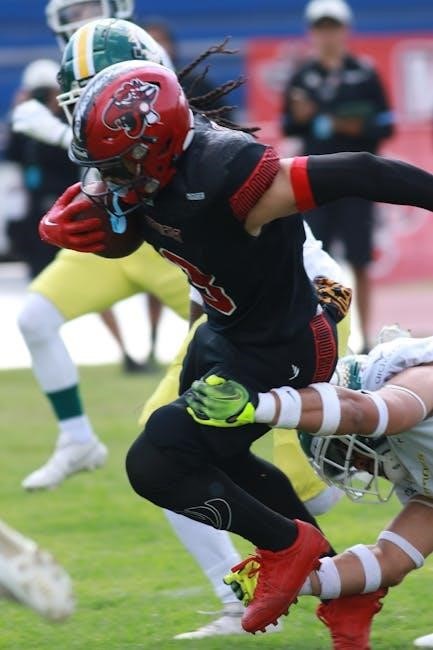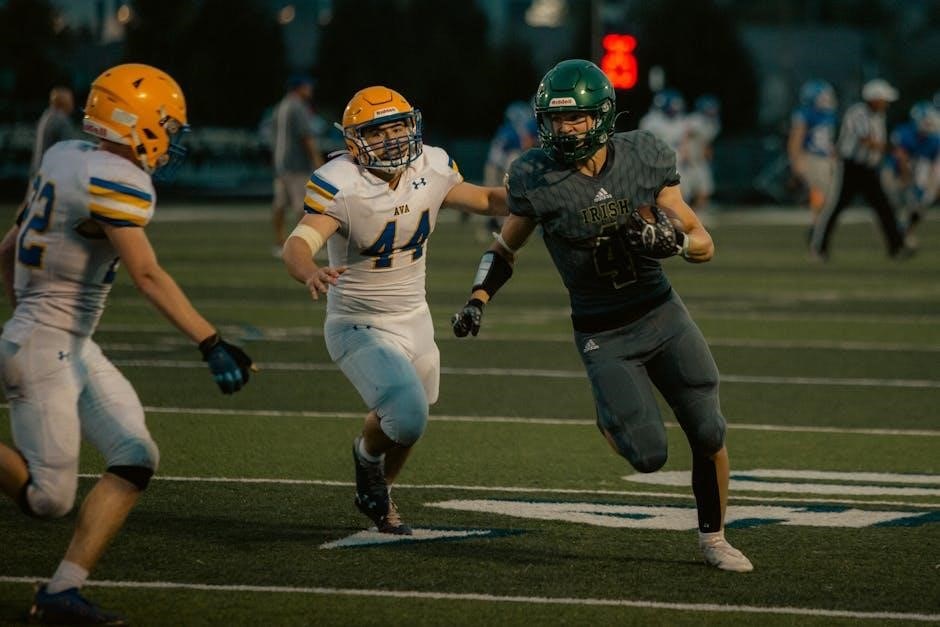split back shotgun offense playbook pdf
Discover the ultimate guide to the Split Back Shotgun Offense. Packed with strategies, formations, and expert tips to elevate your team's performance.
The Split Back Shotgun Offense is a versatile, balanced attack that combines effective run and pass strategies, utilizing two running backs alongside the quarterback for dynamic play execution.
1.1 Overview of the Offense
The Split Back Shotgun Offense features two running backs aligned side-by-side behind the quarterback in a shotgun formation. This setup emphasizes balance, creating threats for both rushing and passing plays. It requires versatile players, including a quarterback, two running backs, and multiple receivers. The formation allows for adaptability, making it suitable for teams of all sizes and skill levels.
1.2 Importance in Modern Football Strategy
The Split Back Shotgun Offense is highly valued in modern football for its versatility and balance, allowing teams to effectively blend run and pass plays. Its adaptability makes it suitable for teams of all sizes, emphasizing systematic execution and strategic play design. This formation is particularly advantageous for teams with two skilled running backs, creating a dual threat that challenges defenses.
History and Evolution
The Split Back Shotgun Offense traces its roots to the 1940s, popularized by Coach Don Faurot. It evolved as a versatile, balanced formation, influencing modern playbooks with strategic adaptability.
2.1 Origins and Development
The Split Back Shotgun Offense originated in the 1940s under Coach Don Faurot, who introduced the formation as a balanced approach to modernize football strategy. Initially designed for quick execution, it emphasized versatility, enabling teams to effectively blend rushing and passing plays. Over time, it evolved into a dynamic system adapted by various coaches, shaping its modern applications in both college and professional football.
2.2 Key Influencers and Coaches
Coach Don Faurot of the Missouri Tigers is credited with popularizing the Split Back formation in the 1940s, revolutionizing modern football strategy. Dale Mueller further influenced its evolution, integrating it into a power spread system. These innovators emphasized balanced attacks and adaptability, shaping the offense into a versatile tool for teams across all levels of competition.

Key Components of the Offense
The Split Back Shotgun Offense features two running backs alongside the quarterback, creating a balanced attack. Key components include player personnel like 1 HB, 3 WR, and 1 TE, with a spread formation setup.
3.1 Player Personnel Requirements
The Split Back Shotgun Offense requires specific personnel, including a versatile quarterback, two quality running backs, three wide receivers, and a tight end. The running backs must be capable of both rushing and receiving, while the quarterback needs strong decision-making skills for RPOs. The tight end should excel in blocking and receiving, adding flexibility to the offense.
3.2 Formation Alignment and Setup
The Shotgun Split Offset formation features two running backs aligned on either side of the quarterback, with the tight end on the left and wide receivers on both sides. This setup creates a balanced look, utilizing 21 personnel (2 RBs, 1 TE, 3 WRs) to maximize versatility in both run and pass plays, emphasizing strategic alignment for diverse play execution.
3.3 Running vs. Passing Emphasis
The Split Back Shotgun Offense balances running and passing, with a focus on creating dynamic play-action opportunities. Power, counter, and sweep runs leverage the two-back alignment, while pass concepts exploit defensive weaknesses. The offense adapts to personnel strengths, emphasizing a balanced attack that keeps defenses guessing and maintains flexibility in play execution and strategic adaptability;

Formation Alignments and Variations
The Shotgun Split Offset and Spread formations are key, offering balanced setups for run and pass plays. These alignments maximize flexibility and create matchup advantages for offenses.
4.1 Shotgun Split Offset Formation
The Shotgun Split Offset Formation positions two running backs on either side of the quarterback, creating a balanced look. This setup enhances both rushing and passing efficiency, forcing defenses to cover multiple threats. It’s ideal for teams seeking versatility and adaptability in their offensive strategy, allowing for effective execution of various play designs and schemes.
4.2 Adjustments for Different Playbooks
The Shotgun Split Back Offense can be tailored to fit various playbooks by adjusting alignments and play designs. Coaches can incorporate RPOs, counter plays, and pass concepts to suit their team’s strengths. This flexibility allows the offense to maintain its balanced attack while adapting to different strategic approaches, ensuring effectiveness across diverse systems and player personnel.

Play Designs and Strategies
The offense features a mix of power, counter, and sweep runs, complemented by RPOs and pass concepts, creating a balanced and dynamic approach to attacking defenses effectively.
5.1 Power, Counter, and Sweep Plays
Power plays utilize double-team blocks to create holes, while counter plays employ misdirection to exploit defensive gaps. Sweep plays stretch defenses sideline-to-sideline, leveraging speed and blocking angles. These runs, executed from the split back formation, emphasize physicality and deception, creating a formidable rushing threat that challenges defenses to adjust and commit resources effectively.
5.2 Pass Concepts and RPOs
The split back shotgun offense integrates pass concepts like slants, fades, and screens, complemented by RPOs (run-pass options) such as zone reads and power reads. These plays exploit defensive weaknesses, creating mismatches and confusion. RPOs allow the quarterback to read defensive reactions and decide between handing off or pulling the ball for a pass, maximizing offensive efficiency and flexibility in attacking defenses.

Benefits of the Split Back Shotgun Offense
The Split Back Shotgun Offense offers a balanced attack, blending run and pass threats, while its adaptability suits teams of all sizes, enhancing strategic execution and flexibility.
6.1 Balanced Attack Capabilities
The Split Back Shotgun Offense excels in creating a balanced attack, seamlessly integrating powerful running plays with precise passing concepts. This dual threat forces defenses to commit resources to both the run and pass, making it challenging for opponents to anticipate and counter effectively. The formation’s symmetry allows for equal distribution of touches between backs, maintaining offensive rhythm and unpredictability.
6.2 Adaptability Across Team Sizes
The Split Back Shotgun Offense is highly adaptable, thriving with teams of all sizes. It works seamlessly for small squads needing efficient execution and large teams requiring complex strategies. This flexibility allows coaches to tailor plays to their roster, ensuring effectiveness at every level, from youth football to professional leagues, making it a universally applicable system.
Challenges and Considerations
Mastering the Split Back Shotgun Offense requires precise execution and timing, as misalignments can disrupt plays. Its complexity demands skilled players and detailed coaching, posing challenges for younger or less experienced teams;
7.1 Execution Difficulties
The Split Back Shotgun Offense demands precise alignment and timing, as improper execution can disrupt plays. Coordinating two running backs and the quarterback requires disciplined practice, especially for younger teams. Miscommunication in RPOs and pass concepts can lead to turnovers, emphasizing the need for repetition and a well-trained squad to maintain consistency and effectiveness in high-pressure situations.
7.2 Defensive Adjustments
Defenses often counter the Split Back Shotgun Offense by loading the box to stop the run and using nickel or dime packages to address pass threats. Exotic blitzes and gap discipline are employed to disrupt timing and force quick decisions. Defenders must balance run-pass keys, as the offense’s versatility demands constant adjustment to neutralize its dual threats effectively.
Case Studies and Successful Implementations
The Split Back Shotgun Offense has been successfully implemented by teams like the Missouri Tigers under Coach Don Faurot, showcasing its adaptability and balanced attack capabilities effectively.
8.1 College and NFL Examples
The Split Back Shotgun Offense has been effectively utilized by college programs like the Missouri Tigers under Coach Don Faurot, who popularized the formation. In the NFL, teams such as the Kansas City Chiefs have incorporated similar concepts, leveraging the balanced attack to create mismatches. This formation’s adaptability allows it to thrive in both collegiate and professional settings, emphasizing dynamic play execution and strategic versatility.
8.2 Youth Football Applications
The Split Back Shotgun Offense is highly adaptable for youth football, emphasizing simplicity and skill development. By featuring two running backs, it teaches balanced play execution and fundamental techniques. Coaches can easily install this formation across all age levels, making it ideal for young athletes to learn and execute effectively while building a strong offensive foundation.

Youth Football and Age-Specific Strategies
The Split Back Shotgun Offense is ideal for youth football, allowing age-specific tailoring. It simplifies concepts for younger teams while offering progression to advanced strategies as players develop.
9.1 Simplifying for Young Athletes
The Split Back Shotgun Offense simplifies concepts for young athletes by reducing formation complexity. It focuses on basic assignments and execution, allowing players to develop fundamental skills. Coaches can introduce core plays gradually, ensuring a strong foundation. This approach keeps the game enjoyable while teaching discipline and teamwork, essential for long-term development in football.
9.2 Developing Fundamental Skills
The Split Back Shotgun Offense emphasizes developing fundamental skills like blocking, ball handling, and receiving. Young athletes learn proper execution of run and pass plays, improving their understanding of assignments. This system builds a strong foundation, allowing players to progress seamlessly while mastering essential football techniques tailored to their developmental level.

Advanced Strategies and Innovations
The Split Back Shotgun Offense integrates modern trends, such as RPOs and motion, to create dynamic play designs. Teams can customize strategies to emphasize speed and deception, enhancing execution and adaptability in competitive scenarios.
10.1 Incorporating Modern Trends
The Split Back Shotgun Offense seamlessly integrates modern trends like RPOs and motion to enhance play design. By incorporating these elements, teams can create dynamic, multi-faceted attacks that exploit defensive weaknesses, ensuring adaptability and innovation. This approach allows offenses to stay ahead of defensive strategies while maintaining the core principles of the formation.
10.2 Customizing for Team Strengths
Coaches can tailor the Split Back Shotgun Offense to their team’s strengths by emphasizing specific play designs. For teams with strong running backs, power runs and counters are effective. For pass-heavy teams, RPOs and play-action passes can be highlighted. Adjustments in formation alignment and player personnel ensure the offense maximizes team capabilities, leading to efficient execution and strategic success on the field.
The Split Back Shotgun Offense offers a versatile, balanced approach for teams of all sizes, combining effective run and pass strategies with adaptability, making it a valuable offensive system.
11.1 Summarizing Key Points
The Split Back Shotgun Offense is a versatile, balanced system combining run and pass strategies. It emphasizes adaptability, execution, and strategic play design, making it effective for teams of all sizes. By utilizing two running backs and a quarterback, it creates a dynamic threat, forcing defenses to respect both sides of the field. Its evolution and application across all football levels highlight its enduring value in modern strategies;
11.2 Future Prospects
The Split Back Shotgun Offense is poised for continued growth, adapting to modern trends like RPOs and spread concepts. Its versatility ensures relevance across all levels, from youth to professional football. As teams seek balanced, dynamic attacks, this offense will remain a cornerstone of strategic innovation, offering coaches and players a adaptable system to exploit defensive weaknesses effectively.
Additional Resources and Playbooks
Explore playbooks like Football’s Best Offensive Playbook and the Shotgun Split Backs Formation Playbook for detailed strategies and plays. These resources offer comprehensive guides to mastering the offense.
12.1 Recommended Reading
For deeper insights, explore Football’s Best Offensive Playbook by Dwight Hawkes and the Shotgun Split Backs Formation Playbook. These resources provide detailed strategies, play designs, and installation guides for the Split Back Shotgun Offense. Additionally, online forums and coaching communities offer free PDF guides and play diagrams to enhance your understanding of the offense.
12.2 Accessing Detailed Playbooks
Detailed playbooks for the Split Back Shotgun Offense can be found in resources like Football’s Best Offensive Playbook and online forums offering free PDF guides. Websites specializing in football strategies provide downloadable diagrams and play charts. Coaching clinics and communities also share adaptable playbooks tailored for youth, high school, and advanced levels, ensuring comprehensive coverage of formations and techniques.

